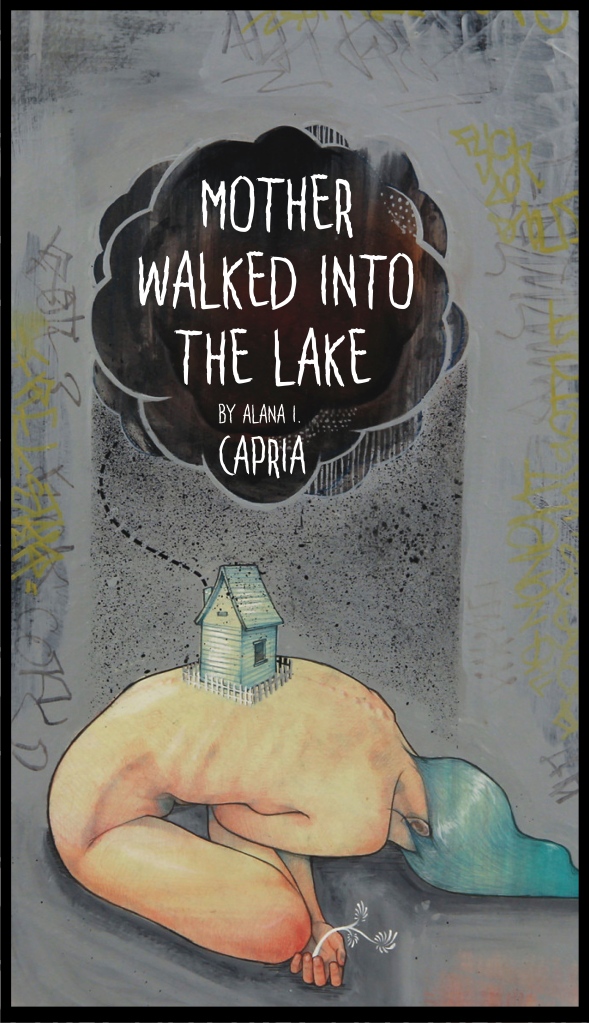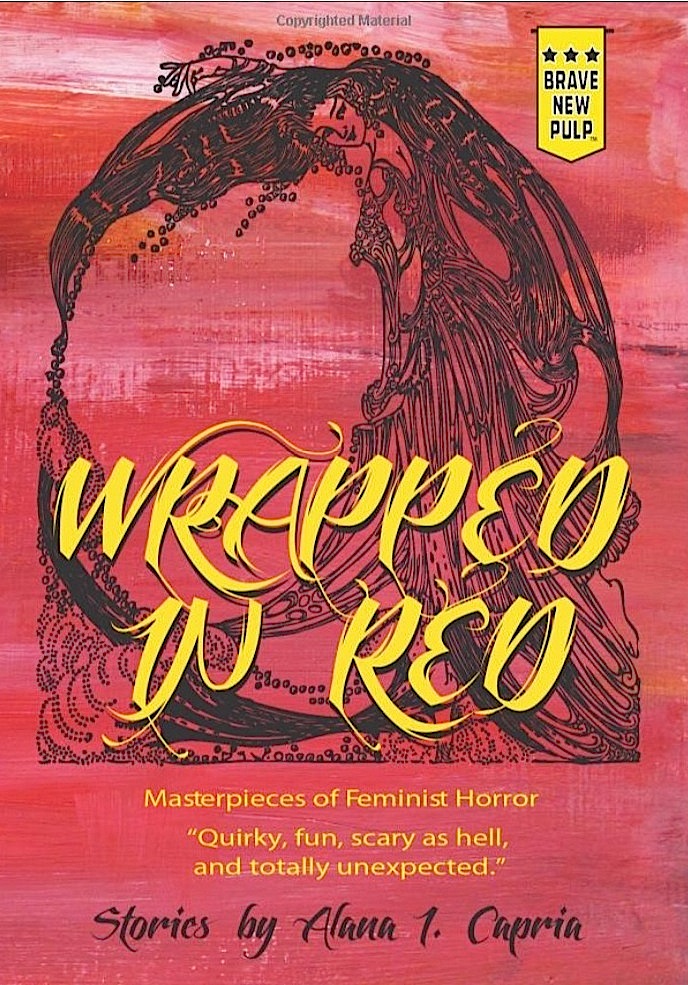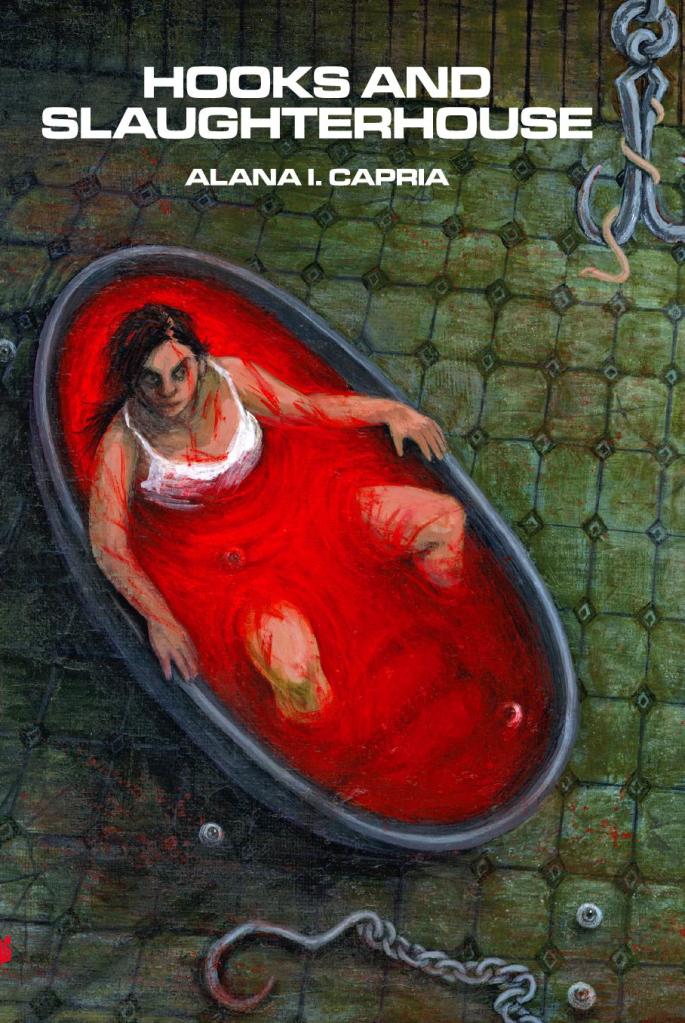
https://www.barnesandnoble.com/w/mother-walked-into-the-lake-alana-i-capria/1127190653?ean=9780997292459
http://www.spdbooks.org/Products/9780997292459/mother-walked-into-the-lake.aspx
EXCERPT FROM MOTHER WALKED INTO THE LAKE —
Mother walked into the lake. It was a round lake, with gray water that was always smooth, even during storms. Mother waited until the sky was charcoal. She waited until there was lightning. She stood at the back of the house, just inside the storm door, and she watched the lake. Her eyes were as gray as the water. In her pupils, the lake water frothed. Mother blinked slowly, her eyelids coming together as if in sleep, then spreading. Mother did everything delicately. She scrambled eggs by barely stirring the spoon. She birthed Sister, Brother, and I with the softest of whispers, the laziest of pushes. She slept without a sound or movement. Mother stood inside the back door. She looked out into the storm, then pushed the screen door open. The latch came undone in her hand. The door swung. The wind caught the door edge and pushed it, slamming the aluminum against the side of the house. The siding broke in several places, the wood interior exposed to the elements. Over time, those cracks would grow as the water got inside, then froze, then thawed. The wood beneath softened. Termites ate what was soggy…
Mother went out into the storm. She walked barefoot through the grass, following a small dirt path down to the lake, which had no fish or frogs or snakes. Sister, Brother, and I watched her from the window and although we called, Mother! Mother!, she walked without looking back. Mother went to the edge of the lake and touched the gray water with her toes. Mother looked like a ballerina, her left leg extended before her, her right leg planted upon the ground. She tested the water’s cold. She brought her left leg back to the grass, extended her right leg. She touched the water again, feeling the surface, dipping her foot in more. The water looked like concrete. We pressed our ears to the moist window glass. We wanted to hear Mother breathe. We thought the rasp of her lungs would be audible above the storm. Mother splashed in the lake. We heard her between breaks in the thunder. The lightning cracked above, splintering the sky into infinite black pieces. Mother looked up, then down. Mother looked into the lake. She stepped with her right foot, bringing it down like she did when walking through grass, but the lake was deep. It was a natural lake and the bottom was far away. When it was warm, Sister, Brother, and I were allowed to swim circles around the lake. There was no ground as far as we knew. We dove down to touch the mud but could never reach. The grass was a ledge with nothing beneath…
Mother fell into the lake. In the midst of the storm, Mother plunged. The lake splashed as Mother’s head disappeared. Mother sank down and down. She did not flail, she did not kick. Down and down she went, until she settled in the cold mud below. There, Mother sat in ooze and filth and green. Mother spat water from her mouth. She bubbled and gurgled. Sister, Brother, and I watched the lake from the window atop the house. We waited for Mother to splash back into the air, for her to swim ashore and pull herself onto the grass. We waited for Mother to spit gray water from her lungs. But Mother only sank. We saw the top of her head, then we did not. She did not come clambering out. We waited nearly an entire night before realizing. There was no Mother then. There was only a lake…
After Mother drowned in the lake, Father tried saving her. He ran through the downpour and slipped in the mud. He fell repeatedly in the grass, tumbling. His ankles snapped and sprained. Father limped to the edge of the lake. He threw himself upon his belly and plunged his arms into the water. He felt around, reaching for Mother’s hair, her hands. Sister, Brother, and I imagined Mother alive in that water, her toes pointed towards the lake bottom, arms extended overhead, fingers stretched, waiting to catch Father, hair streaming as a halo, eyes wide and blinking. Father flailed in the water. He reached and reached but could not touch the bottom. Father heaved himself over the edge, bobbed in the water, slipped down. He dove for Mother. He went down deep, combing the water for her. He struggled for a piece of her dress, a knot in her hair. All he needed was a handful of her. Father tried but Mother was too far away. Mother was part of the water now…
The house was lonely without Mother. We missed her. We were children and did not know how to cope with Mother’s loss. We—Sister, Brother, and I—walked the house together and remembered Mother. Mother baked delicious bread. Mother grilled perfect steak. Mother knew when to open the windows, when to close them. We never suffered nightmares when Mother was near. Mother could create a garden from a florist’s bouquet. Mother had a recipe for the most delicious chocolate chip cookies. Mother carved jack-o’-lanterns so that the faces were grotesque in candlelight. Mother stitched our names onto the tags of our clothing, then cut the tags so that we did not itch. Mother sewed large patchwork quilts she laid across our laps at night. Mother stoked the fireplace in the living room, then gave us pumpkin pie and hot chocolate. Mother made Father laugh, made us laugh louder. Mother took photographs of us laughing. Mother made homemade candy canes for Christmas. Mother stuffed the turkey on Thanksgiving. Mother dyed eggs in pastel colors and intricate patterns for Easter. Mother smelled of spun sugar and vanilla caramel. Mother smelled of fresh milk and grass. Mother smelled of lavender and honey. When Mother laughed, it was the tinkling of bells. Mother made us feel religion. When she pressed her wrists against our foreheads, we felt blessed. Mother told us stories about the moon and the sun and the stars, about the galaxy as a whole and what came before everything. Mother told us of cows floating across the moon, of little boys playing trumpets, of little girls followed about by baby sheep. She told us stories about a house very much like this one, a little house with a little family and a little lake, one in which everyone in the house always enjoyed one another’s company..
When we had dinner, Mother sat at one end of the table, Father sat at the other, and we three sat between. Mother served us all. Mother cut thick slices of pork and laid the meat across our plates. She gave us mashed potatoes and gravy. Mother watched us eat before she took a bite. Mother never needed to adjust her seasonings. When we could not sleep, Mother cradled us in our beds until our eyes closed. Sometimes Mother put pillows and blankets in the living room, then tacked a sheet from wall to wall so that the fabric floated above us. We liked those days the best and Mother sat in the tent with us, then went to bed with Father, leaving us in the living room to laugh and point at the sheet ceiling as if we were jabbing our fingers at the stars. Mother knew the names of all the constellations in the sky. During certain times of the year, when it was very hot or very cold, Mother woke us in the middle of the night and brought us outside to the lawn so that we could watch the meteors streak through the dark, their white tails flashing before they fell amongst the silhouettes of pine trees. When Mother drowned in the lake, we longed for those days. We were desperate for them. We cut our thumbs with butter knives and dripped the blood into the kitchen sink. We gave the blood to what might have the power to bring Mother back. We went to sleep, then woke, hoping Mother would be in the kitchen, flipping pancakes and pouring drawn butter. But the kitchen was empty and the stove was cold. There was only our blood spatter at the bottom of the sink, rust-colored against the stainless steel…
Sister and Brother did not remember but I did. Once, long before the storm and the lake, I found Mother asleep. She slept so soundly, I did not want to wake her, but I had to, we needed her. I shook her arm and her shoulder and her hip. Mother did not move. Mother did not wake. I shoved her again and again and each time, Mother seemed farther away. I shouted her name. I said: Wake up, Mother! Wake up! She did not. Mother slept on and on. I went to Father. I said: Mother will not wake. I followed him to her. Father walked fast. He closed the door before I could step into the room. From the other side of the door, I heard everything. The floorboards squeaked, the bed creaked. Father shouted for Mother, he whispered. Father was inside the bedroom for such a long time and I sat upon the hallway floor, my head leaned back against the door. I could not leave, I was afraid to. When the bedroom opened, I nearly fell. Mother and Father stood together, their shadows covering me. They looked so tall. Their faces were black against the light. Mother staggered as Father pulled her past me and to the bathroom. She did not look back. When she spoke, her voice was like water. I forgot this, then remembered. More than anything, I wished to forget again…
I sometimes found Mother hiding. She lay in corners and beneath the bed. It was difficult to see but I always found her. Mother cried. Mother held onto herself as if she might fall from the house or the world. Mother cried and I could not stop her. I tried. I slid into the hiding place with her and held her. Mother cried onto me. Her tears burned. I itched afterward, the sort of itch a person might suffer after soaking in salt water. I was covered with Mother’s tears and they smelled like nothing whenever I put my nose to them. When I slept, I heard Mother cry. She cried within and outside my dreams. Her crying made me uneasy and I could not sleep. I told Father of Mother’s crying, then did not hear her sobs again. The house was quiet then yet I worried for Mother. I heard a sniffle, a sigh. I heard what might have been the start of a sob that was then repressed and swallowed. I felt guilty. I thought perhaps Mother liked the crying and it was my fault she stopped. I worried of what might happen if Mother never cried again. Later, Mother walked into the lake and drowned. I wondered if she might be weeping deep beneath the water…
Sister, Brother, and I did not believe Mother was really gone. We looked for her everywhere. We thought we might find her buried in the walls but there were no holes in which to search. We searched the attic, the planks between the wood, the space behind the beams. We looked in the basement, at the joints between the pipes, the breaks in the stone walls, the cracks around the windows. We looked beneath the dripping sink, the dusty dining room table, the dark of the living room couch. We opened the front door and stared at the dying lawn. We went to the back door and looked towards the lake. We checked all the upstairs windows. We tapped on the stairs in the hopes she might tap back. But Mother was nowhere. We walked to the lake into which Mother drowned. We looked into that strange water. We looked for Mother hovering at the bottom, her toes barely touching the silt, her hair radiating outward. We thought we saw her shadow. We thought the shadow was to the left, then to the right, then just beneath the bank on which we sat. We stirred the water with our fingers. We plunged our hands in to the wrists, then the elbows. As we moved our hands around, we became terrorized by the thought that Mother was right there, her body just beyond, and if she wanted, she could pull us in. We took our hands out of the water. We looked around the yard, stared at the trees bordering the far ends, the house at the top of the hill, the stretch of lawn that went past the lake but was never walked upon. We looked into the water again. We reached once more. We reached more and more, first to our elbows, then to our shoulders. We leaned and wet our faces. We did not touch Mother. She did not touch us. We sat at the edge of the lake. We waited for Mother’s head to break the surface. The lake was still. We put our feet in the water and kicked…
That night, we could not sleep. We suffered terrible dreams of Mother clawing her way up from the lake, her body green with algae, wet hair dripping in her face. She stood in every doorway and poured water onto the floor. First, she poured cups of water, tipping a glass horizontally so that it spilled, but then she dropped the glass. The water came from her. It poured from her ears and her eyes and her nose and her mouth. Mother seemed to choke upon that water. She opened her mouth wide so that it could pour over her bottom teeth and lip. Mother let all that drowning out. The water puddled beneath her feet. It streamed down her legs. It came from her throat and her stomach and her hips. The water smelled of the lake. It pooled upon the floor, flooded the wood, came streaming towards us. Sister, Brother, and I huddled together on my bed. We clung to one another as the bed rocked from side to side. It pitched against the walls, floated upon the water. The bed bucked us but we held on, our fingers clutching at the fitted bed sheet. The water rose, as did the bed. Soon, our heads bumped the ceiling. Mother stayed in the doorway, dripping and splashing, and the water went over her head while she burbled. We looked over the edges of the bed, watched for her. In that stinking gray water, Mother poured herself out and all we could see was her shadow…
Copyright 2017. Alana I. Capria. All Rights Reserved.

